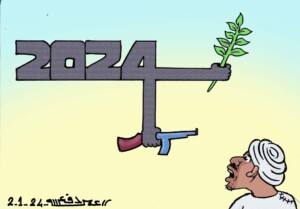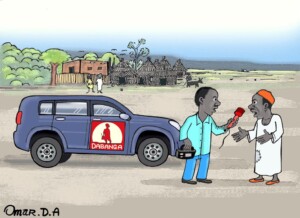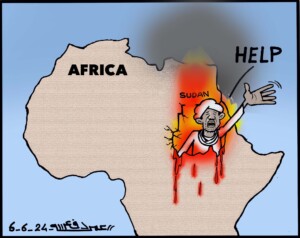West Darfur governor urges justice for atrocities
West Darfur governor Mohamed El Doma urged Sudan’s Attorney General to prosecute atrocities committed in the past, as key witnesses and investigators are dying or suffering from dementia.
 Um Zeifa village in Darfur after an attack by government-backed militiamen in December 2004 (HRW)
Um Zeifa village in Darfur after an attack by government-backed militiamen in December 2004 (HRW)
West Darfur governor Mohamed El Doma urged Sudan’s Attorney General to prosecute atrocities committed in the past, as key witnesses and investigators are dying or suffering from dementia.
Governor El Doma, a former chairman of the Darfur Bar Association (DBA), described the situation during his address to a virtual DBA conference on transitional justice as “dangerous”. He referred to the death of main witnesses and investigators, including Maulana Mohamed Baraka and Dafallah Yousef. Others suffer from dementia.
El Doma especially called on the Attorney General to start proceedings on the Janjaweed attack in Wadi Salih in Central Darfur in 2004, where at least 145 people were killed. He pointed at the alleged involvement of a former governor in the mass murder. The suspects are still at large.
He said that the victims and displaced people criticised the International Criminal Court Prosecutor Fatou Bensouda for not visiting them during her recent visit to Sudan. “We don’t know what Fatou Bensouda did during her visit. Many questions remain. Will the suspects be tried in Sudan? If so, based on which laws?”
El Doma said that justice faces major problems in Sudan. He called for a Sudanese model of transitional justice that takes into account Sudanese customs and traditions, such as the ajaweed, tribal leaders who mediate and arbitrate in tribal conflicts in Darfur.
El Doma lamented the proliferation of weapons in Darfur and South Kordofan. He called for comprehensive disarmament campaigns, describing former campaigns as “ceremonial”. He also seeks the deportation of thousands of settlers from Chad, Niger and Mali, who occupied land that the displaced had to leave. During the regime of ousted President Omar Al Bashir, herders from countries west of Sudan were invited to inhabit the areas where Darfuri farmers used to live. They torched many of the deserted villages. Militias such as the Rapid Support Forces, set-up by the Al Bashir regime, protected these settlers in Darfur for years.
El Doma stressed that services must be provided to the displaced in their villages and areas of origin, so that they can return and settle.
Radio Dabanga’s editorial independence means that we can continue to provide factual updates about political developments to Sudanese and international actors, educate people about how to avoid outbreaks of infectious diseases, and provide a window to the world for those in all corners of Sudan. Support Radio Dabanga for as little as €2.50, the equivalent of a cup of coffee.












 and then
and then